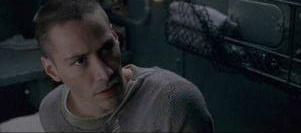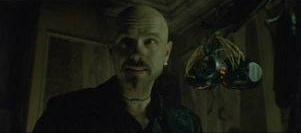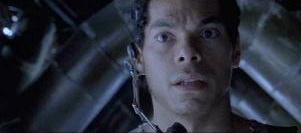Neo, I Don't Think You're In Wonderland
Anymore

The "Alice In Wonderland" & "Wizard of Oz"
Storyline Connections

Author: Dew
Property of Dew's Matrix Fan Page (http://www.oocities.org/hollywood/theater/9175)
IMPORTANT: For those of who are writing Matrix papers for school and wish to use my site as a source remember that all the articles on this site are copyrighted. This means that you MUST list Dew's Matrix Fan Page (http://www.oocities.org/hollywood/theater/9175) as a source and site all references or quotes according to your teacher's requirements. Keep in mind that while I have tried to ensure the accuracy of this site's contents, I do not and can not take responsibility for any errors or omissions. In another words, you should not rely on this site's information without first checking its accuracy.
And while it is not an academic requirement, I strongly encourage you to email me and tell me if you have used, or plan to use, my articles as a source in a paper. I ask for your feedback because it is the only way that I know that my site is useful and helps me gauge what kinds of new articles are needed.
WARNING: Under no circumstances is this site's information/articles to be reproduced or transmitted in any form or by any means, in whole or in part, without prior permission.


Note: The book "Alice In Wonderland" was written by Lewis Carroll. It actually contains two stories. The first one is titled "Alice's Adventures in Wonderland" and the second one is called "Through The Looking-Glass." The recent "Alice In Wonderland" movie on television combined aspects of both stories together.
In "The Matrix," the two stories in "Alice In Wonderland" are alluded to in many ways and on different levels. The directors (who are big fans of the book) did so because they wanted to help convey the fact that the Matrix is a lot like Wonderland: crazy, surreal, and illogical. Here are some examples:
Morpheus refers directly to Alice falling down the rabbit hole into Wonderland TWICE in different statements: "I imagine right now you're feeling a bit like Alice, tumbling down the rabbit hole?" and "You take the red pill, you stay in Wonderland, and I show you how deep the rabbit hole goes."
In "The Matrix," Cypher confesses his regret over getting unplugged. ("You know, um, I know what you're thinking, because right now I'm thinking the same thing. Actually, I've been thinking it ever since I got here. Why, oh, why, didn't I take the blue pill?")
In "Alice's Adventures in Wonderland," Alice expresses a similar form of regret: "It was much more pleasant at home," though poor Alice, "when one wasn't always growing larger and smaller and being ordered by mice and rabbits. I amost wish I hadn't gone down that rabbit hole--and yet--and yet--it's rather curious, you know, this sort of life."
In "Alice's Adventures In Wonderland," Alice meets a rabbit after falling down a rabbit hole and tries to follow him. In "The Matrix," Neo is told to "follow the white rabbit." Afterwards, he meets a woman who has a white rabbit tattoo on her shoulder. She, as well as her companion, invite him to a club and he tags along. Rabbits are also seen again in the matrix, this time on a tv screen, when Neo enters the Oracles's living room
There is also a "late meeting" similarity as well regarding the rabbits in both movies. Choi is two hours late meeting Neo and Choi blames Dujour for it, while the rabbit in Wonderland pulls out his pocket watch and tells Alice "Oh, dear! Oh, dear! I shall be too late."
In Wonderland Alice finds various bottles and food items that have notes attached with the words "drink me" or "eat me." When she does so, her body physically changes dramatically. In "The Matrix," Neo is offered a choice between two different pills. The result of his decision greatly affects his physical body as well. In addition, the Oracle offers Neo a cookie, telling him that after he eats it, he'll feel "right as rain" and Cypher offers Neo a drink.
In Wonderland Alice asks a cheshire cat for directions while a "deja vu" black cat crosses Neo's path. Neo also asks for directions while in the matrix. One character in "The Matrix" is nicknamed Mouse and in Wonderland Alice meets a mouse in the pool of tears. She also meets a dormouse at the Mad Hatter's Tea Party--interestly, the dormouse is constantly falling asleep.
In Wonderland Alice nearly drowns in a pool of her own tears. While in the matrix sewer system, Neo barely stays afloat until the crew rescues him.
Both of Alice's trips, one to Wonderland and the other to the Looking-Glass world, occur while she is sleeping. Neo is sleeping while he is in the matrix simulated world.
Alice enters the Looking-Glass world through a mirror that magically becomes fluid-like so she can climb into it. As Alice tells her kitten:
" 'Let's pretend there's a way of getting through into it, somehow, Kitty. Let's pretend the glass has got all soft like gauze, so that we can get through. Why, it's turning into a sort of mist now, I declare!' And certainly the glass was beginning to melt away, just like a bright silverly mist."In "The Matrix" Neo enters the real world after being consumed by a mirror which, like Alice's mirror, appeared normal at first but then took on a fluid-like property.
In the Looking-Glass world everything is backwards, including a book that Alice tries to read. This is because everything is appears reversed or backwards when viewed in a mirror. As for "The Matrix," the code is made up of backward Japanese letters.
In Wonderland, a pigeon complains to Alice about not having "a wink of sleep" in three weeks.
In "The Matrix," Agent Smith points out that Neo is actually two people--Neo and Thomas A. Anderson. In Chapter 1 of "Alice's Adventures in Wonderland," Alice ponders a similar dual-personality concept: "But it's no use now to pretend to be two people! Why, there's hardly enough of me left to make ONE respectable person!"
In "The Matrix" all of the characters names (as well as many symbols and concepts) have double, sometimes even multiple meanings. According to the Wachowski brothers, this was intentional. While in the Looking-Glass world, Alice has a conversation about word meanings with Humpty Dumpty: "My name is Alice, but----"Later on in their conversation, word meanings come up again:
"It's a stupid name enough!" Humpty Dumpty interrupted impatiently. "What does it mean?"
"MUST a name mean something?" Alice asked doubtfully.
"Of course it must," Humpty Dumpty said with a short laugh."When I use a word," Humpty Dumpty said, in rather a scornful tone, "it means just what I choose it to mean--neither more nor less."
"The question is," said Alice, "whether you CAN make words mean so many different things."In "The Matrix," Neo has some trouble figuring out his role in the world. However, as Trinity tells Neo "the matrix cannot tell you who you are." When Neo goes to see the Oracle, she asks him if he believes he is the One and then points to a plaque that reads "Know Thyself." In Chapter 2 of "Alice's Adventures In Wonderland," Alice says:
"Dear, dear! How queer everything is today! And yesterday things went on just as usual. I wonder if I've changed in the night? Let me think---WAS I the same when I got up this morning? I almost think I can remember feeling a little different. But if I'm not the same, the next question is, 'Who in the world am I?' Ah, that's the great puzzle!"While in the Looking-Glass world, Alice considers going into the woods where things have no names. "I wonder what'll become of MY name when I go in? I shouldn't like to lose it at all--because they'd have to give me another, and it wold be almost certain to be an ugly one." Once she is the woods, Alice does find herself unable to remember who she is. As Alice says, "Then it really HAS happened, after all! And now, who am I? I WILL remember, if I can! I'm determined to do it!"
In "Through The Looking-Glass," the idea of "a dream within a dream" and the questioning of what is real and what is not real occurs repeatedly, just like in "The Matrix". (For my numerous Matrix examples concerning dreams, sleeping, and reality please see my Themes page.)
"Isn't he a LOVELY sight?" said Tweedledum. Alice couldn't say honestly that he [the Red King] was. He had a tall red nightcap on with a tassel, and he was lying crumpled up into a sort of untidy heap, and snoring loud--"Fit to snore his head off!" as Tweedledum remarked.
"I'm afraid he'll catch a cold lying on the damp grass, "said Alice, who was a very thoughful little girl.
"He's dreaming now," said Tweedledee. "And what do you think he's dreaming about?"
Alice said, "Nobody can guess that."
"Why, about YOU!" Tweedledee exclaimed, clapping his hands truimphantly. "And if he left off dreaming about you, where do you suppose you'd be?"
"Where I am now, of course," said Alice.
"Not you!" Tweedledee said contemptuously. "You'd be nowhere. Why, you're only a sort of thing in his dream!"
"If that there King was to wake, " added Tweedledum, "you'd go out--bang--just like a candle!"
"I shouldn't!" Alice exclaimed indignantly. "Besides, if I'm only a sort of thing in his dream, what are YOU, I should like to know?"
"Ditto," said Tweedledum.
"Ditto, ditto!" cried Tweedledee. He shouted this so loud that Alice couldn't help saying, "Hush! You'll be waking him, I'm afraid, if you make so much noise."
"Well, it's no use YOUR talking about waking him, "said Tweedledum, "when you're only one of the things in his dream. You know very well you're not real."
"I AM real!" said Alice who began to cry.
"You won't make yourself a bit realler by crying," Tweedledee remarked. "There's nothing to cry about."
"If I wasn't real," Alice said--half laughing through her tears, it all seemed so ridiculous--"I shouldn't be able to cry tears."
"I hope you don't suppose those are REAL tears?" Tweedledum interrupted in a tone of great contempt. [Compare that last line to this one from Morpheus: "You think that's air you're breathing now? Hmmm."]
Four chapters later in this story, Alice goes on to say:"So I wasn't dreaming, after all," she said to herself, "unless--unless we're all part of the same dream [like the matrix world]. Only I do hope it's MY dream, and not the Red King's! I don't like belonging to another person's dream," she went on in a rather complaining tone, "I've a great mind to go wake him, and see what happens!"


In "The Matrix," the movie "The Wizard of Oz" is referred to many times. In fact, not only is the Matrix is a lot like Oz, but the character of Neo is very similar to Dorothy as well. Here are some examples of "The Wizard Of Oz" Connection: Cypher refers directly to this movie when he says to Neo, "Buckle your seat belt, Dorothy, cuz Kansas is going bye-bye."
In "The Wizard Of Oz" Dorothy is told by the Good Witch to "follow the yellow brick road." In "The Matrix," Neo is told by Trinity to "follow the white rabbit." In both cases, these helpful clues lead both characters on the right path.
In "The Wizard Of Oz," Dorothy tells everyone she meets that she wants to go home, back to Kansas. In "The Matrix," the first thing that Neo asks Morpheus upon realizing the truth, is "I can't go back [to the only home I know --the matrix--], can I?"
Both Neo and Dorothy spend much of their time sleeping/dreaming. Both have a hard time separating what is actually a dream and what has really happened to them. Both characters are captured by their enemies (Dorothy is captured by the Wicked Witch of the West and Neo is captured by the agents at his office building.) In addition, both are captured because they have something the other side wants---power. In Dorothy's cases, the wicked witch wants Dorothy's ruby slippers because of their magical powers. As for Neo, the agents want Neo to lead them to the Morpheus because he is their biggest threat.
Both movies end similarly--both of the main characters wake up from a nightmarish reality (a dream state) to find a loved one beside them, wishing that they would wake up.
In their alternate realities, both Neo and Dorothy go on a trip to see a wise, powerful person who they believe will have all the answers. (Neo sees the Oracle and Dorothy sees The Oz.) Interestingly enough, both of them also find that the answers to their questions (as well as the power to succeed in their quests) lie within themselves. (Neo can change the matrix himself; Dorothy can go home on her own.)
People go see Professor Marvel and The Oracle to have their fortunes read because they supposely have the ability to see into the future.
The world of the matrix is tinted in green (the color the code) and the Wicked Witch of the West is a hideous shade of green.
In "The Matrix," Neo gets to see his friends (Morpheus, Trinity, Apoc, Switch, and Mouse) as well as his enemy, Cypher, in the real world as well as in the matrix. As for Dorothy, she sees her friends on the farm plus her mean neighbor in Kansas and Oz (her dream state). In both cases, all the characters that Neo and Dorothy have contact with appear physically changed when moved into the alternate reality.
Both Neo and Dorothy ask for directions in their dream states because they find themselves lost.
In both movies, issues concerning the heart, the mind, and the belief in yourself (courage) are prevalent.
Towards the end of "The Wizard of Oz," the wicked witch plans on killing Dorothy's friends first (so Dorothy can watch them die). Fortunately, she is stopped before she can hurt any of them. (After all, this is a children's movie!)
As for "The Matrix," Cypher manages to kill several of Neo's allies (two of them in front of Neo) before he is stopped.Both movies have a "miracle" occur in which a minor character is able to save the main character's life. In "The Matrix," it is when Tank shoots Cypher before he can unplug Neo. The "Wizard Of Oz" miracle occurs when Glinda the Good Witch causes it to snow so that Dorothy (who has been drugged by the Wicked Witch) will wake up. In both movies, the main characters sleep in their alternate realities. (Neo sleeps in front of his computer and in his bed; Dorothy falls asleep in the poppy fields.)
In "The Wizard Of Oz," water plays a key role since it is the way in which Dorothy is able to kill the Wicked Witch Of the West. In "The Matrix," water is used throughout the movie--in fact, the code of the matrix looks like falling rain.
As noted above, the matrix world is tinted green. Well, in the original book, "The Wonderful Wizard of Oz" by L. Frank Baum, there is a man at the gate leading into the Emerald City who calls himself the "Guardian of the Gate." His job includes locking a pair of green spectacles onto the eyes of anyone who wants to enter the city. When Dorothy questions why this is done, he replies, "Because if you did not wear spectacles the brightness and glory of the Emerald City would blind you. Even those who live in the City must wear spectacles night and day. They are all locked on, for Oz so ordered it when the City was first built, and I have the only key that will unlock them."
Once inside the Emerald City, Dorothy and her friends immediately notice that everything is green or had a green tint. As it states in the book, "The window panes were of green glass; even the sky above the City had a green tint, and rays of the sun were green. There were many people, men, women and childreen, walking about, and these were all dressed in greeen clothes and had greenish skins."
Later on, when Dorothy and her friends discover that the Great Oz is merely a balloonist from Omaha, he confesses that "Just to amuse myself, and keep the good people busy, I ordered them to build this City, and my Palace, and they did it all willingly and well. Then I thought, as the country was so green and beautiful, I would call it the Emerald City, and to make the name fit better I put green spectacles on all people, so everything they saw was green."
© Copyright 1999-2003 by Dew, owner of Dew's Matrix Fan Page. No part of this text may be written, copied or reproduced without express written consent.


